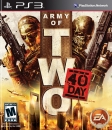adriane23 said:
Veknoid_Outcast said:
Now that's simply not true. You said earlier that a critic should put aside his opinions and judge a game "for what it's trying to accomplish," whatever that means.
It sounds as if you don't want gaming journalists at all. Just a yes-man who corroborates your own taste in games.
|
Just as I suspected, you don't get it. You probably won't get this either, but I'll give you something to think about. I don't want a "yes-man" journalist or a "no-man" journalist, I want an objective journalist.
|
OK, then please unpack that term. When you say "objective," what do you mean? Does that mean you want a journalist who writes without any personal feelings or interpretations?
That is a useful thing to have in a reporter, certainly. But when it comes to a reviewer, he should most definitely include his personal feelings and interpretations. Because those feelings and interpretations, along with his experience playing games, are what gives his position meaning. No one can, and no one should, evaluate a piece of art in an objective way. You can either have a dispassioned description of a game or you can have a subjective critical analysis. You cannot have both.

































































